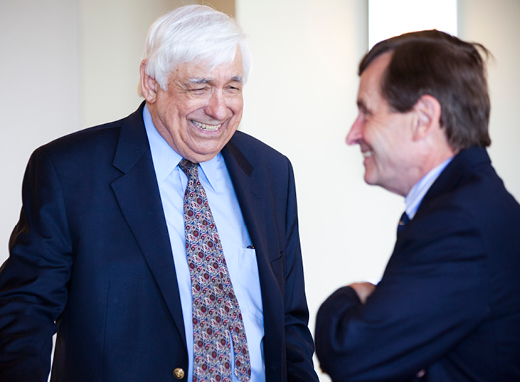Epidemiology Professor John Boring Retires

John Boring (left) served on the search committee that led to James Curran's appointment as dean of the Rollins School of Public Health.
John Boring once aspired to be a professional baseball pitcher. But after trying out with two different teams, "Lefty" Boring reasoned that he might be better suited for another profession.
This year, he attained the status of professor emeritus of epidemiology after 46 years of teaching at Emory.
"John Boring most definitely played a transformative role in our school," says Rollins Dean James Curran. "He helped lay the groundwork for what became the Department of Epidemiology and trained more than two generations of students in public health and medicine."
Boring came to Emory in 1966 by way of CDC, where he served with the Epidemic Intelligence Service and later as a senior scientist with expertise in microbiology. Tom Sellers, then chair of Emory's Department of Preventive Medicine, invited him to teach epidemiology in the School of Medicine. The field of epidemiology was just coming into its own, and Boring taught students what he calls "denominator science"—known today as evidence-based medicine.
"At that time, physicians thought medicine was deterministic and not probabilistic," said Boring during his retirement celebration at Rollins. "No one was teaching inductive reasoning. For every numerator, you need an appropriate denominator. The larger the denominator, the more reliable the conclusion."
Boring also became one of the "midwives" to Rollins. In the mid-1970s, he taught in the master's of community health program, the genesis of RSPH. Some years later, when the School of Medicine created the Department of Epidemiology and Biostatistics, Boring led the epidemiology division as part of the MPH program. After Rollins was established as a school in 1990, Boring chaired the Department of Epidemiology. Under his guidance, the curriculum evolved, the doctoral program was formed, and enrollment grew. And he brought many of the current faculty on board, including Dana Flanders, Harland Austin, David Kleinbaum, Michelle Marcus, Carrie Drews-Botsch, and Carol Hogue, who holds the Jules and Uldeen Terry Chair in Maternal and Child Health, the first endowed professorship at Rollins.
"John was the person who made me feel comfortable as a new faculty member," says Kleinbaum, who dedicated the second edition of his textbook, Logistic Regression: A Self-Learning Text, to his colleague and mentor.
In 2002, Boring stepped down as chair to teach full time at Rollins and in the School of Medicine, where he introduced "Analytic Medicine," a required course for first-year medical students, several years earlier. He also co-directed the Master of Science in Clinical Research (MSCR) program, which he helped establish in 1998 for physicians who wanted to merge science and clinical practice.
To date, the MSCR program has graduated 120 students who enter with MD or PhD credentials. The program is based in the Atlanta Clinical and Translational Science Institute, led by David Stephens, Emory vice president for health sciences research and author of the NIH proposal that launched the program.
John McGowan, professor of epidemiology and director of the MD/MPH program at Rollins, codirects the MSCR program with Boring. "He convinced me to work with Dr. Stephens to set up the program," says McGowan. "John can convince you to do anything—he is such a good coach and cheerleader."
Students also share that sentiment. Medical students selected Boring as Teacher of the Year five times. He received the Thomas F. Sellers Jr. M.D. Award (1993), which honors a Rollins faculty member deemed as a role model by colleagues, and the Thomas Jefferson Award (1995), Emory's highest faculty honor.
Although Boring is officially retired, he will continue doing what he loves best: teaching students.
"When I came here, it was the right time and the right place," he says. "I was advised and carried along by some wonderful people who are responsible for what Rollins is today. Every day I've spent at Emory has been more than satisfactory for me."—Pam Auchmutey


